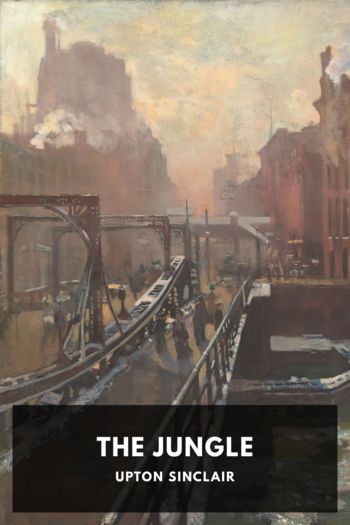Arrowsmith by Sinclair Lewis (learn to read books txt) 📕

- Author: Sinclair Lewis
Book online «Arrowsmith by Sinclair Lewis (learn to read books txt) 📕». Author Sinclair Lewis
The thin mysterious woman passenger vanished, staggering with her suitcase—she had said no word, and they never saw her again. The Commission, with Stokes and the harbor-police who had manned the launch, carried the baggage (Martin weaving with a case of the phage) through the rutty balconied streets to the San Marino Hotel.
Once or twice faces, disembodied things with frightened lips, stared at them from alley-mouths; and when they came to the hotel, when they stood before it, a weary caravan laden with bags and boxes, the bulging-eyed manageress peered from a window before she would admit them.
As they entered, Martin saw under a street light the first stirring of life: a crying woman and a bewildered child following an open wagon in which were heaped a dozen stiff bodies.
“And I might have saved all of them, with phage,” he whispered to himself.
His forehead was cold, yet it was greasy with sweat as he babbled to the manageress of rooms and meals, as he prayed that Leora might not have seen the Things in that slow creaking wagon.
“I’d have choked her before I let her come, if I’d known,” he was shuddering.
The woman apologized, “I must ask you gentlemen to carry your things up to your rooms. Our boys—They aren’t here any more.”
What became of the walking stick which, in such pleased vanity, Martin had bought in New York, he never knew. He was too busy guarding the cases of phage, and worrying, “Maybe this stuff would save everybody.”
Now Stokes of St. Swithin’s was a reticent man and hard, but when they had the last bag upstairs, he leaned his head against a door, cried, “My God, Arrowsmith, I’m so glad you’ve got here,” and broke from them, running … One of the Negro harbor-police, expressionless, speaking the English of the Antilles with something of the accent of Piccadilly, said, “Sar, have you any other command for I? If you permit, we boys will now go home. Sar, on the table is the whisky Dr. Stokes have told I to bring.”
Martin stared. It was Sondelius who said. “Thank you very much, boys. Here’s a quid between you. Now get some sleep.”
They saluted and were not.
Sondelius made the novices as merry as he could for half an hour.
Martin and Leora woke to a broiling, flaring, green and crimson morning, yet ghastly still; awoke and realized that about them was a strange land, as yet unseen, and before them the work that in distant New York had seemed dramatic and joyful and that stank now of the charnel house.
IIIA sort of breakfast was brought to them by a Negress who, before she would enter, peeped fearfully at them from the door.
Sondelius rumbled in from his room, in an impassioned silk dressing-gown. If ever, spectacled and stooped, he had looked old, now he was young and boisterous.
“Hey, ya, Slim, I think we get some work here! Let me at those rats! This Inchcape—to try to master them with strychnin! A noble melon! Leora, when you divorce Martin, you marry me, heh? Give me the salt. Yey, I sleep fine!”
The night before, Martin had scarce looked at their room. Now he was diverted by what he considered its foreignness: the lofty walls of wood painted a watery blue, the wide furnitureless spaces, the bougainvillaea at the window, and in the courtyard the merciless heat and rattling metallic leaves of palmettoes.
Beyond the courtyard walls were the upper stories of a balconied Chinese shop and the violent-colored skylight of The Blue Bazaar.
He felt that there should be a clamor from this exotic world, but there was only a rebuking stillness, and even Sondelius became dumb, though he had his moment. He waddled back to his room, dressed himself in surah silk last worn on the East Coast of Africa, and returned bringing a sun-helmet which secretly he had bought for Martin.
In linen jacket and mushroom helmet, Martin belonged more to the tropics than to his own harsh Northern meadows.
But his pleasure in looking foreign was interrupted by the entrance of the Surgeon General, Dr. R. E. Inchcape Jones, lean but apple-cheeked, worried and hasty.
“Of course you chaps are welcome, but really, with all we have to do I’m afraid we can’t give you the attention you doubtless expect,” he said indignantly.
Martin sought for adequate answer. It was Sondelius who spoke of a nonexistent cousin who was a Harley Street specialist, and who explained that all they wanted was a laboratory for Martin and, for himself, a chance to slaughter rats. How many times, in how many lands, had Gustaf Sondelius flattered proconsuls and persuaded the heathen to let themselves be saved!
Under his hands the Surgeon General became practically human; he looked as though he really thought Leora was pretty; he promised that he might perhaps let Sondelius tamper with his rats. He would return that afternoon and conduct them to the house prepared for them, Penrith Lodge, on the safe secluded hills behind Blackwater. And (he bowed gallantly) he thought that Mrs. Arrowsmith would find the Lodge a topping bungalow, with three rather decent servants. The butler, though a colored chap, was an old mess-sergeant.
Inchcape Jones had scarce gone when at the door there was a pounding and it opened on Martin’s classmate at Winnemac, Dr. the Rev. Ira Hinkley.
Martin had forgotten Ira, that bulky Christian who had tried to save him during otherwise dulcet hours of dissection. He recalled him confusedly. The man came in, vast and lumbering. His eyes were staring and altogether mad, and his voice was parched:
“Hello, Mart. Yump, it’s





Comments (0)